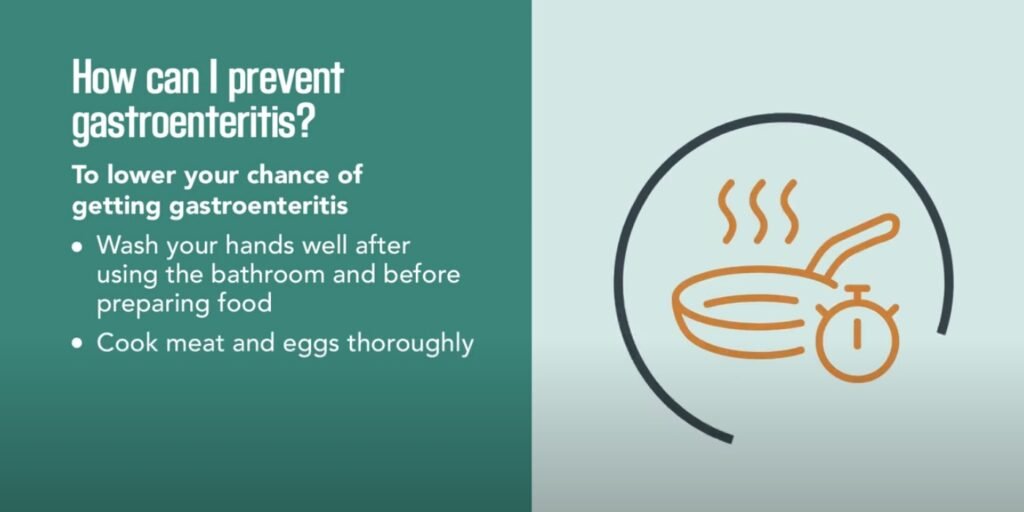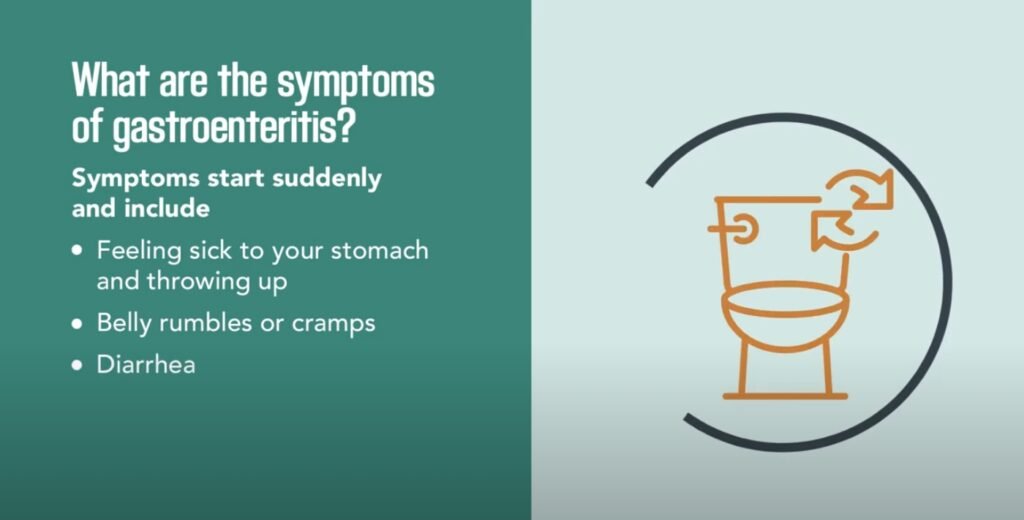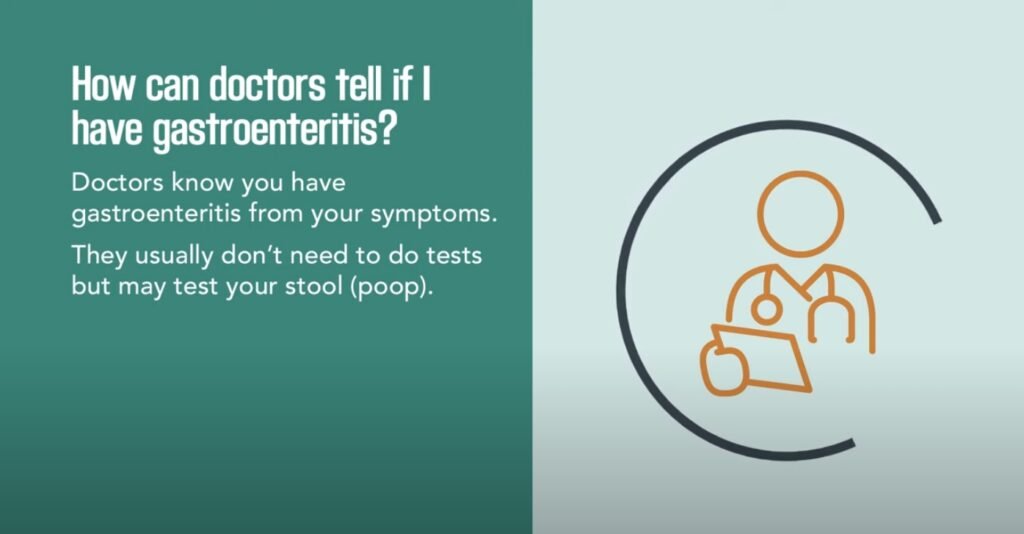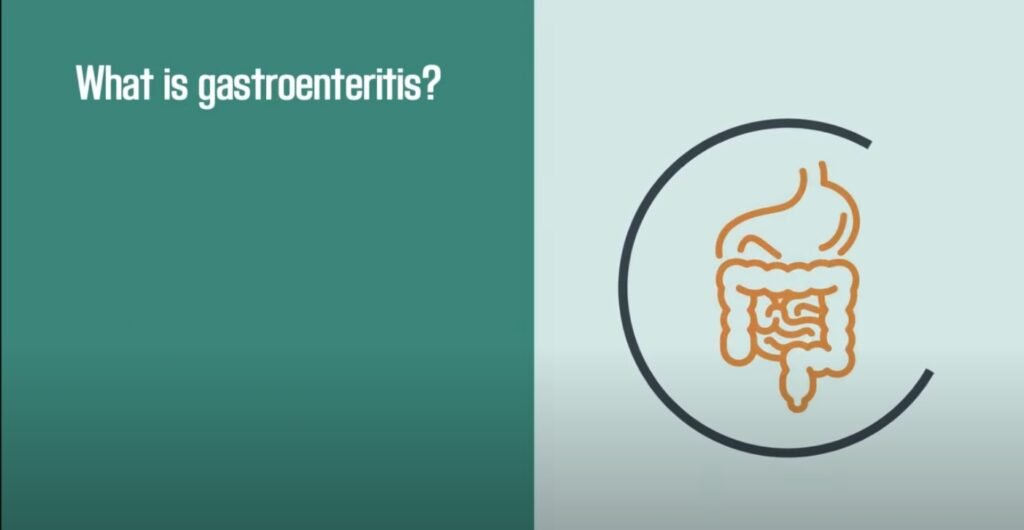Gastroenteritis is an acute inflammation of the lining of the stomach and small bowel, primarily resulting from infection through contaminated food or water. This condition doesn’t discriminate, affecting both children and adults alike.
Symptoms
Symptoms of gastroenteritis typically manifest suddenly, beginning with feelings of nausea and abdominal cramps, followed by vomiting, diarrhea, fever, and weakness. In severe cases, individuals may experience intense rectal burning, blood, and mucus in stools, as well as frequent loose or watery bowel movements. Dehydration is a significant concern, marked by sunken eyes, dry skin, tongue, thirst, weakness, and potential muscle cramps. Acidosis, indicated by deep rapid respiration, may occur as the body attempts to eliminate excess carbon dioxide. Abdominal pain, especially in the lower regions, is common and can indicate potassium deficiency. The duration of the illness can vary from a few hours to a week.
Causes
Gastroenteritis can stem from various causes, with the most severe cases often attributed to microbial contamination. Foods prepared at home or in restaurants are susceptible to contamination by toxins or harmful substances produced by different types of germs. Commonly contaminated foods include meats, fish, cream-filled pastries, milk, and desserts. Contamination often arises from infected hands, skin, or coughing. Some individuals may have allergies to specific foods, exacerbating their symptoms. Additionally, reactions to medications, cathartics, or chemicals can trigger gastroenteritis. Symptoms typically arise within two to four hours after consuming contaminated food or water.
Insights from Great Minds
As Mahatma Gandhi once said, “It is health that is real wealth and not pieces of gold and silver.” This sentiment underscores the importance of maintaining good health to prevent illnesses like gastroenteritis.
Treatment
Treatment of gastroenteritis primarily involves supportive care. Patients should rest in bed and refrain from consuming any food while experiencing nausea and vomiting. Applying gentle heat to the abdomen can help alleviate spasms or pain. Rehydration is crucial, and patients should drink plenty of boiled water with electrolyte formulations. An oral rehydration solution, comprising lemon juice, water, salt, and sugar, can be administered multiple times a day. To mitigate vomiting, ice packs can be applied to the stomach, throat, and spine, while cold compresses on the abdomen can offer relief when changed regularly. Once vomiting subsides, warm drinks like barley or rice water can be consumed, followed by a bland diet consisting of rice, curd, apples, and ripe bananas. Avoidance of oily and spicy foods is recommended. Gradually reintroducing a well-balanced diet rich in whole grains, lightly-cooked vegetables, and fresh fruits is advisable after complete recovery.
Prevention

Preventing gastroenteritis involves adopting various measures to minimize exposure to contaminated food or water. Avoiding raw or stale foods, especially during the monsoon or summer months, can significantly reduce the risk. Drinking boiled water during the rainy season is essential to prevent waterborne infections. Thoroughly washing fruits and vegetables in a potassium permanganate solution, along with frequent handwashing before meals, is crucial. Regular nail trimming, proper food storage in a fly-free, well-ventilated environment, and adherence to personal hygiene practices are essential. Maintaining a clean kitchen and ensuring no sewage drains are near water supplies further mitigates the risk of gastroenteritis outbreaks.
In conclusion, understanding the causes, symptoms, treatment, and prevention strategies for gastroenteritis is crucial for maintaining overall health and well-being. By implementing appropriate measures and heeding the advice of health professionals, individuals can reduce the likelihood of experiencing this debilitating condition. Remember, as Benjamin Franklin famously said, “An ounce of prevention is worth a pound of cure.”
What to Know About Viral Gastroenteritis (Stomach Flu)

Symptoms
Viral gastroenteritis, commonly known as stomach flu, manifests with various symptoms:
- Loose, watery diarrhea: Occurs more than three times per day.
- Fever or chills: Often accompany gastrointestinal distress.
- Nausea and vomiting: Common symptoms experienced during viral gastroenteritis.
- Headache, muscle aches, or joint aches: Additional discomfort may be present.
- Sweating or clammy skin: Can occur due to dehydration.
- Abdominal cramps and pain: Often accompany diarrhea.
- Loss of appetite: Common during the illness.
As the symptoms of viral gastroenteritis can be severe, it’s crucial to recognize them and seek appropriate medical attention if necessary.
“The stomach flu is incredibly contagious and can spread rapidly, causing discomfort and disruption in affected individuals.” – Dr. Lisa Ashe
Causes
Viral gastroenteritis is caused by various viruses, including norovirus, rotavirus, adenovirus, and astrovirus. These viruses can spread through:
- Contaminated food or water: Consuming contaminated substances can lead to infection.
- Close contact with infected individuals: The virus can spread easily through physical contact.
- Sharing utensils or items: Transmission can occur through shared objects.
- Touching contaminated surfaces: Viruses can survive on surfaces and infect individuals who come into contact with them.
- Poor hand hygiene: Not washing hands properly, especially after using the bathroom or handling food, can facilitate the spread of the virus.
Complications
While viral gastroenteritis typically resolves on its own, it can lead to complications, particularly dehydration. Complications may include:
- Nutritional imbalances: Prolonged illness can lead to nutritional deficiencies.
- Body weakness or fatigue: Dehydration and illness can cause weakness and fatigue.
- Muscle weakness: Lack of fluids and nutrients can affect muscle function.
Dehydration is a severe complication, especially in infants and young children. It’s essential to monitor symptoms closely and seek medical attention if signs of dehydration are present.

Treatment
Treatment for viral gastroenteritis focuses on managing symptoms and preventing dehydration. Key treatment measures include:
- Fluid replacement: Drinking plenty of fluids to prevent dehydration is crucial. Oral rehydration solutions, such as Pedialyte, can be beneficial.
- Medications: Over-the-counter medications may help manage symptoms like diarrhea and vomiting. However, it’s essential to consult a healthcare professional before taking any medication, especially in children.
- Dietary adjustments: Consuming bland foods like rice, potatoes, and bananas can help ease stomach discomfort.
Home Remedies
In addition to medical treatment, several home remedies may help alleviate symptoms:
- Heating pad or heat pack: Applying heat to the abdomen can help relax muscles and reduce pain.
- Brown rice water: High in electrolytes, rice water can aid in rehydration.
- Ginger and mint: Ginger tea or mint tea may help soothe nausea and digestive discomfort.
- Yogurt or kefir: These dairy products contain beneficial bacteria that can help restore gut health.
Prevention
Preventing viral gastroenteritis involves practicing good hygiene and taking precautions:
- Hand hygiene: Wash hands frequently, especially before eating and after using the bathroom.
- Avoid sharing utensils: Minimize contact with potentially contaminated objects.
- Food safety: Ensure proper cooking and handling of food to prevent contamination.
- Stay hydrated: Drink plenty of fluids to maintain hydration levels.
- Vaccination: Consider vaccinating infants against rotavirus to prevent illness.
Summary
Viral gastroenteritis, or stomach flu, is a common illness caused by various viruses. It presents with symptoms like diarrhea, vomiting, and abdominal pain. While usually self-limiting, it can lead to dehydration and other complications, particularly in vulnerable populations like infants and older adults. Treatment focuses on symptom management and fluid replacement, while prevention strategies include good hygiene practices and vaccination. By understanding the symptoms, causes, treatment options, and preventive measures, individuals can better cope with and prevent the spread of viral gastroenteritis.

FAQs (Frequently Asked Questions)
- Can viral gastroenteritis be treated with antibiotics?
- Explanation of why antibiotics are ineffective against viral infections.
- Is stomach flu the same as influenza (the flu)?
- Clarification of the differences between gastroenteritis and influenza.
- How long does it take to recover from viral gastroenteritis?
- General timeline for recovery based on individual symptoms and severity.
- Can viral gastroenteritis cause long-term complications?
- Discussion of potential long-term effects on digestive health.
- What should I do if I suspect I have viral gastroenteritis?
- Recommendations for symptom management and when to seek medical attention.
- Are there any dietary restrictions during recovery from stomach flu?
- Guidance on foods to avoid and those that may aid in recovery.
